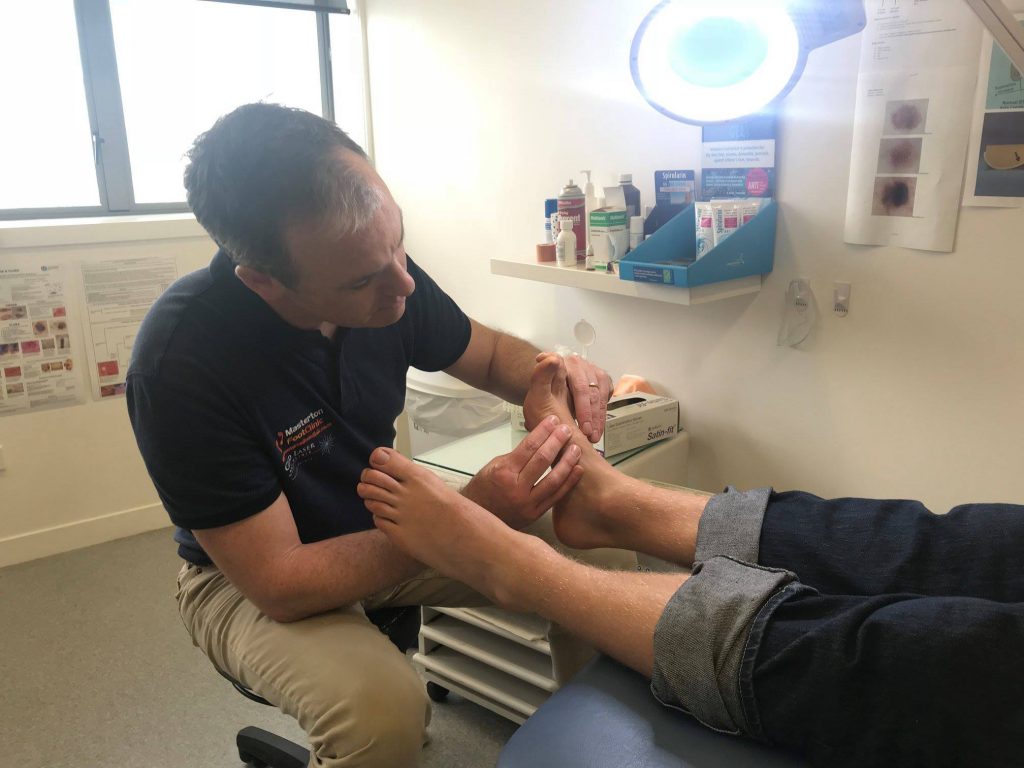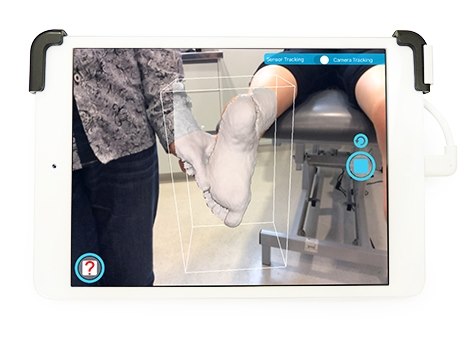Biomechanical assessments are a standard part of every appointment for patients experiencing any musculoskeletal pains or injuries in their feet and legs here at Masterton Foot Clinic. It is a very comprehensive assessment that is key in both diagnosing your problem and identifying all the contributing factors that have led to its development – and your ongoing discomfort. This enables our podiatrists to create the best, evidence-based treatment plan to get you the best outcomes for the long-term.
Detailed podiatric assessment for foot pain or injury
A biomechanical assessment allows us to identify what we need to do to both treat your current symptoms, and to help prevent the issue from returning in the future. We perform this assessment if you’ve come to see us for:
 Knee pain
Knee pain- Leg pain
- Ankle pain
- Heel pain
- Foot pain
- Children’s growing pains
- Sports-related pain
- Problems associated with walking or movement
- Arthritic joint pain
We do not perform biomechanical assessments if you’ve come to see us for skin or nail-related problems, including corns, callus and warts, fungal nail or skin infections, ingrown toenails and the like. These fall under the category of ‘skin and nail care’ appointments. In these appointments, the focus is on prompt management for your nail or skin complaint, which is often a simple and quick fix.
Your biomechanical assessment includes
 Assessing your foot posture and alignment
Assessing your foot posture and alignment- Checking the movement range available in your joints to look for any restrictions that may be causing problems or hypermobility that may need better control
- Checking your muscle strength and balance
- Assessing your gait – the way your feet and legs function together as you move and walk, including any abnormal characteristics, rotations, movements and more. This is recorded via video so we can show you what we’re seeing
- Assessing the suitability of your footwear and the impact it’s having on your gait
- Pressure testing – seeing where your joints and bones may be exposed to excessive loads and pressure
- Additional tests as needed based on our findings – may include nerve testing, balance and proprioception testing, and very specific tests used to identify the injury extent with certain problems
We’ll also do hands-on palpation of the problem area to help identify the damaged or vulnerable structures, go through your medical history, understand your usual physical activities, movement patterns and daily demands, and what has led you to your current problem.
Biomechanical Assessment FAQ’s
What does a gait assessment do?
A gait assessment looks at how your muscles, bones, joints and ligaments all work together as you’re moving to create the movement pattern you have. When we look at your gait, we use the findings to help explain the symptoms you may be experiencing and use this information to best guide your treatment. We can also use this information to improve how you move to help you perform better in sports and daily life.
What happens if I need an X-ray or ultrasound?
If you need any form of medical imaging to confirm a diagnosis or examine the extent of an injury or problem, we will refer you for one. We’ll then read the imaging results given to you by your radiographer and use this information to best guide your treatment.
Why has my pain started now?
Our bodies can handle a certain amount of stress. If the stress and strain applied to the body exceeds what we can safely handle, damage occurs, and pain starts. If your pain has recently started, something will have happened to exceed that limit – whether it be an extra long day on your feet, starting a new physical activity, insufficient rest and recovery, or something else.
What caused my foot pain?
This is a little like asking what has caused your stomach ache – it can be so many things! The most common reasons for foot pain include overusing the foot – particularly going too hard too fast or starting a new physical activity, switching from wearing supportive footwear to unsupportive footwear, trauma to the foot, and muscle tightness or weakness.
We don’t do any guesswork at our clinic – if you have foot pain, we’ll uncover the likely causes as part of your assessment.
How long does it take to recover from an injury?
This depends entirely on how severe your injury is. Very mild injury may require just a week or two. Severe injuries may take many months. We’ll advise you of what you can expect at your appointment and do everything we can to help you improve as quickly as possible.
How can I recover from foot pain quickly?
We offer a range of innovative treatments to help you recover as quickly as possible. These include shockwave treatment for faster healing and repair, foot mobilisation therapy, orthotics, and much more.
Should I use ice or a heat pack for my injury?
Ice should be used in the initial stages of an injury where you have swelling or inflammation. The ice can be applied on and off to help reduce the swelling and ease your pain. It constricts the blood vessels. Once the swelling has subsided, you can switch to heat to help promote healing. There are some injuries where this advice may not be suitable or heat or ice should not be used, so your podiatrist will let you know their recommendations at your appointment.
Should I strap my foot?
Strapping is a great way to help add more stability to a joint, reduce unwanted painful movement, and support the injured tissues. We often apply strapping in the initial stages of an injury to offer some much-needed relief. There are many different types of strapping techniques for different purposes – and it’s important that you use the right one. We are happy to teach you the best strapping technique for your injury at your appointment with us.
Is my foot pain caused by my flat feet?
It could be. Flat feet are a cause or a contributing factor to a variety of foot and leg pains and injuries, however, just because you have flat feet, does not mean that they have caused your injury or that you are definitely going to develop foot pain. The only way to truly know if they are related is to have a biomechanical assessment.
